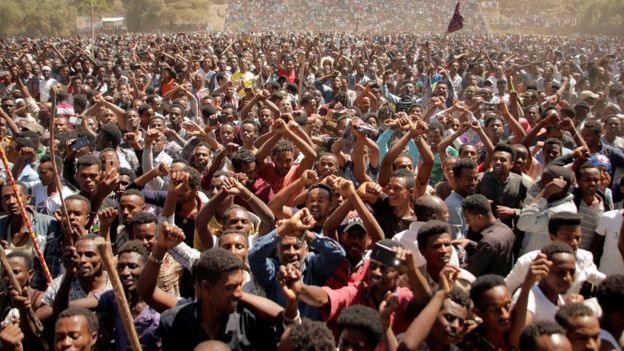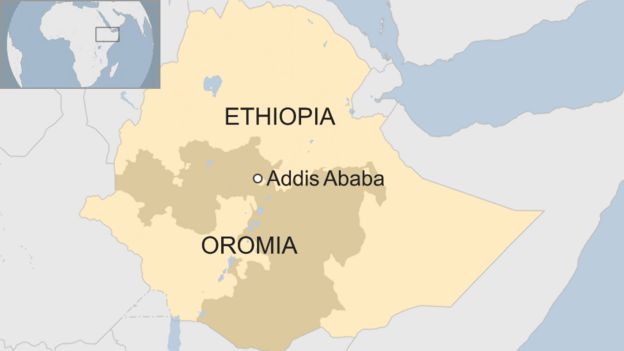
Ethiopians have woken up to a new leader, and a renewed sense of hope.
Abiy Ahmed has been voted in as leader of Ethiopia's ruling coalition, paving the way for him to step into the shoes of Prime Minister Hailemariam Desalegn, who unexpectedly resigned last month.
He inherits a country which has seen some of the fastest economic growth in the world in recent years.
But it has also been riven by years of protests by people who feel marginalised, with a government accused by many of human rights violations - including torture and extrajudicial killing of political dissidents.
So is Mr Abiy - praised as an astute politician with impressive academic and military credentials - the man to lead Ethiopia into a peaceful, prosperous and free future?
Mr Abiy's background is crucial to the way people view him.
When he is sworn in, he will become the country's first Oromo leader - the ethnic group at the centre of nearly three years of anti-government protests, which have left hundreds of people dead.
One of their main complaints is that they have been politically, economically and culturally marginalised for years - despite being the country's largest group.
The election of Mr Abiy - who is believed to have huge support among the Oromo youth as well as other ethnic groups - may change that.
He is leader of the Oromo People's Democratic Organisation (OPDO), one of the four ethnic parties which make up the ruling the Ethiopian People's Revolutionary Democratic Front (EPRDF) coalition.

There have been massive protests in Oromia in recent years
The 42-year-old, who was born in the city of Agaro in Oromia and comes from a mixed Christian-Muslim family, joined the OPDO in the late 1980s.
He has served in the military and rose to the rank of Lieutenant Colonel, before becoming the founder and director of the country's Information Network and Security Agency, which is responsible for cyber-security in a country where the government exercises tight control over the internet.
After that he became the minister for science and technology.
Mr Abiy is seen by many as outspoken and competent, with a participatory leadership style, leaving opposition figures cautiously optimistic about the future - as long as he tackles the issues behind the unrest and unhappiness in Ethiopia.

Jawar Mohammed, the US-based director of the Oromia Media Network, who has been accused of stoking the protests, wrote on Facebook: "This appointment carries a unique opportunity, in the real sense of the term, if he is determined enough to capture it, that can translate into the great and historical responsibility of leading Ethiopia and its peoples into the peaceful transition to democracy."
Yeshiwas Assefa, who leads the Blue Party, told the BBC: "The main point is he has to be someone who understands the demands of the public and the public's desire for change... He has to reform institutions in dire need of reform.
"We hope Mr Abiy understands well the public's demand for change.... [and] guessing from various speeches he personally made, Mr Abiy seems to be someone who has a sympathetic view of those demands."
But Bekele Gerba, deputy head of the Oromo Federalist Congress, who was released from prison earlier this year, pointed out that the power to make changes, like lifting the state of emergency, may not lie with Mr Abiy.
"What I think will determine the country's fate is how much the military and intelligence community work with and obey the new prime minister, how much they'll become faithful to the constitution. So things must be seen from this perspective," he said.
The enormity of the task ahead has not passed by residents living around the country - and like many of the opposition leaders, the state of emergency imposed after Mr Hailemariam resigned in February was at the very top.
Kibour Gena, a businessman who lives in the capital Addis Ababa, told the BBC: "There are priority assignments forwarded by the party that await the new PM; and at the top of his list of priorities will be the state of emergency and bringing peace.
"In order to bring sustainable development and ensure fruitful, long-lasting efforts in the country, peace is of primary importance. So it is necessary to look whether the state of emergency restores or hinders peace."
But there seems to be some confidence he can fulfil those tasks.
Mohamed Ali, who lives in Weldia, in Amhara region, said he and his friends had been waiting all night for the news, which came at midnight.
"Every one of us was happy for Abiy Ahmed," he said. "We believe that he will restore peace and stability in the country. I was extremely happy. I hope that he will manage to make a difference, especially among the youth."
Mebratu Dubale, who lives in Hawassa (in Southern Nations, Nationalities and Peoples Region), added: "I know he is qualified given his level of education as well as his experiences and his determination in that regard.
"He will be able to finish what was started and lead the country towards a better direction than the one we are currently in."
More about Ethiopia: